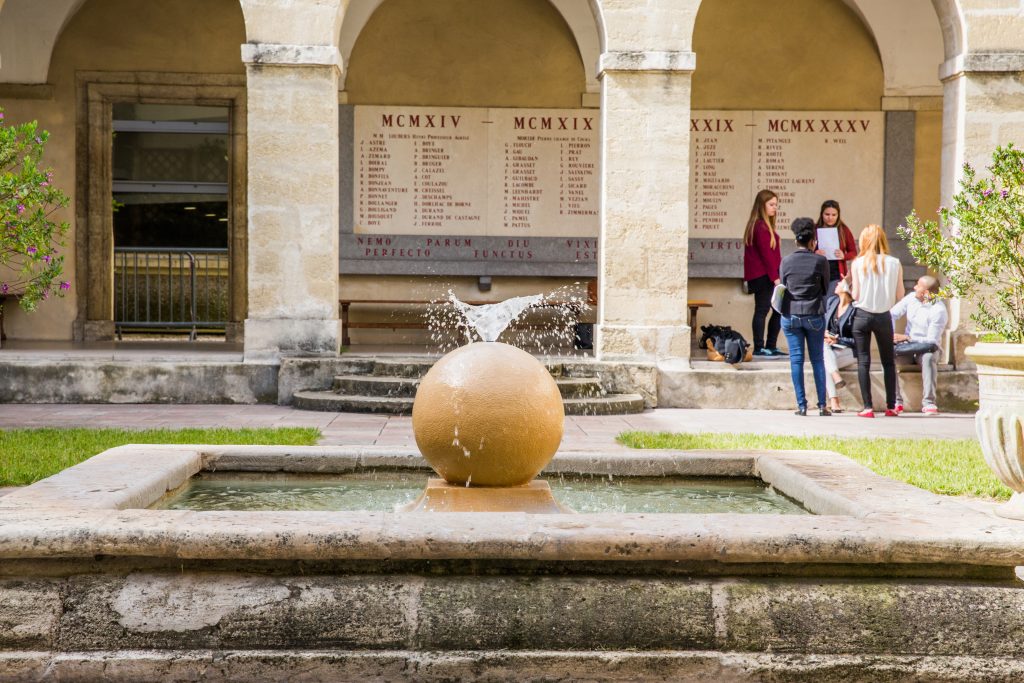Search
Our dynamic research activities are punctuated by numerous scientific events and publications, whose high academic standards are regularly underlined by the individual and collective assessments of our researchers. As a result, Montpellier's Faculty of Law and Political Science is recognized as a leading academic research center.

Covering a highly diversified range of topics, our research themes combine in-depth expertise in a variety of fundamental areas with the ability to participate in single- or multi-disciplinary research networks, particularly in the " Feed, Care, Protect" area, for which the University of Montpellier is internationally recognized.
RESEARCH STRUCTURES
In public law, the collective work ofIDEDH (Institut de Droit Européen des Droits de l'Homme) currently focuses on the societal role of human rights in Europe, the renewal of relations between man and animal, and European guarantees of fundamental rights in the face of digital development. Those at CERCOP (Centre d'études constitutionnelles comparatives et politiques) focus on many facets of constitutional law (comparative law, constitutional litigation), as well as legal theory and, in particular, the relationship between law and science. CREAM (Centre de recherches et d'études administratives de Montpellier) focuses on the many facets of administrative law and public business law.
In private law, the collective work of the LDP (Laboratoire de droit privé) favors an international approach (notably within the framework of a Laboratoire International Associé) and a cross-disciplinary approach to legal issues, institutions and instruments. TheEDSM (Montpellier School of Social Law) pursues labor law research on collective bargaining and occupational health. The CDE (Centre du droit de l'entreprise) focuses its research on contracts, intellectual property and corporate assets.
At the crossroads of several legal disciplines, the LICeM (Laboratoire Innovation communication et Marché) brings together legal experts specializing in economic law, digital law and intellectual property, whose work focuses on the relationship between innovation and the law. The Montpellier Criminal Law and Forensic Sciences Team(EDPFM) brings together researchers from several disciplines (notably law and medicine) for a cross-disciplinary approach to criminal law and forensic sciences, combining approaches from law, criminology, sociology, forensic science and forensic medicine. The École de Droit de la Santé (Health Law School) favours interdisciplinary approaches within the legal field, and multidisciplinary approaches to human issues. Finally, the Institut des usages studies unwritten law and leads a project entitled "Coutumes d'Occitanie d'Aujourd'hui".
In the history of law, in addition to the historical aspects of work carried out by other teams, particular mention should be made of the collective work carried out by the Institut d'Histoire du Droit Edmond Meynial(IHD), on a wide variety of themes, which always demonstrate the usefulness of looking to the past to better understand the present and the future, particularly in law.
In the field of political science, CEPEL (Centre d'Études Politiques Et Sociales - Environnement, Santé, Territoires) stands out for its political science work and its multi-disciplinary approach, combining political science, sociology, ethnology, philosophy and epidemiology. In addition to the classic subjects of political science, approached through the prism of territorial issues, CEPEL's current research programs are linked to the themes of " Feed, Care, Protect", including environmental and food policy issues, as well as work on new forms of participation and citizen appropriation of these issues.
It is not uncommon for several research teams to work together on cross-disciplinary research programs, for example within the University of Montpellier's Labex "Entreprendre", or in other contexts, to analyze transformations linked to the imperative of sustainable development, or to understand the legal changes implied by digital technology. They all contribute to the reputation of Montpellier's academic research by being part of national and international research networks.
UM - CNRS Research Units
- Corporate Law Center (CDE)
- Center d'Etudes Politiques Et sociaLes : Environnement, Santé, Territoire (CEPEL)
- Center for Constitutional and Political Studies and Research (CERCOP)
- Center de Recherches et d'Etudes Administratives de Montpellier (CREAM)
- Montpellier School of Social Law (EDSM)
- Montpellier Criminal Law and Forensic Sciences Team (EDPFM)
- European Human Rights Law Institute (IDEDH)
- Edmond MEYNIAL Institute of Legal History
- Private Law Laboratory (LDP)
- Innovation Communication and Market Laboratory (LIC)
DOCTORAL TRAINING
Under the terms of its bylaws, the Montpellier Faculty of Law and Political Science is responsible for preparing doctorates in Law and Political Science, in collaboration with the Doctoral School of Law and Political Science.
Each year, two lecture series are organized for the benefit of the University's doctoral students and, in some cases, students from all universities, so that their growing and constant success is a measure of the strong interest these events hold for young researchers.
The cycle of methodological lectures aims to provide students with the general keys to progressing through the thesis and the incomparable years of the doctorate, without ever taking the place of research supervisors: training in university pedagogy; research methodology and ethics; writing tips; teaching commentary on Conseil d'Etat and Cour de cassation judgments; getting to grips with the first few months of the thesis; preparing for the end of the thesis and the defence; etc. This cycle integrates the professional integration of Montpellier doctorates through the organization of lectures to present candidates for master's degrees, or the contribution of a doctorate to magistrates' duties. This cycle includes professional integration for Montpellier doctorates, with lectures on how to apply for a master's degree, or on the contribution of a doctorate to a magistrate's position. The program also includes support for competitive examinations to become a lecturer or administrative magistrate, through the organization of auditions and mock orals. In this context, the local agrégation conference offers our candidates the opportunity to take part in a large number of mock lessons.
The cycle of thematic conferences is directly based on proposals from doctoral students, who are invited each year to submit topics they feel need to be explored in greater depth.